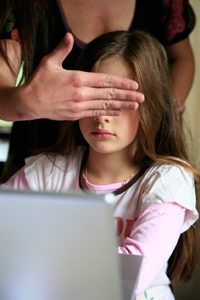How can I Keep my Child Safe Online?
The internet is a great educational tool but it comes with hidden dangers. If you don’t keep your eye on them, children may be exposed to inappropriate material. You can protect them and help them take responsibility for their own safety

The internet is a valuable educational tool, providing information for homework and learning as well as advice – but it comes with hidden dangers. If you don’t keep a close eye, children may be exposed to inappropriate material or lured into chatting with strangers. While you can protect them from many influences, your child will need to take responsibility for their own safety as they grow and become more independent. This guide offers essential advice on how to keep your child safe online.
LEARN ABOUT THE BENEFITS OF LEARNING THROUGH QUIZZES
Understanding Children's Online Time
Research indicates that, on average, children spend over six hours a day on computers, smartphones, watching TV, or playing video games. Another report highlighted that, even in 2013, 57% of 3-17 year-olds used the internet at home, compared to only 11% in 1997. With the surge in mobile and wearable devices, the time children spend online continues to increase.
New government measures implemented in 2015 ensure that all schools use effective safety filters, and children are educated about online threats. As parents, you will also want to protect your child; hence, here are some useful tips for online safety.
Supervising Your Child Online
It's advisable to supervise young children's internet time, not only to learn subjects together but also to understand the internet's positive and negative aspects. Make browsing a positive experience, offer warnings when necessary, and encourage them to talk to you about their online activities. Always set clear boundaries. Ideally, the PC or laptop should be used in an open family area where you can keep an eye on your child's online activities, helping them with homework and reducing the chance of accessing unsuitable sites. However, with the prevalence of phones and tablets, internet access is almost everywhere.
Using Parental Controls
Most internet providers offer parental controls that can be utilised to block specific websites, restrict searches for inappropriate material, and prevent access to social media sites. While older children may express dissatisfaction with these restrictions, consider creating a 'Safe List' of approved websites. Encourage your child to report any accidental exposure to unsuitable content, and consider using 'Broadband Shields' for more nuanced control.
Some internet providers have 'Broadband Shields', enabling you to block websites based on daytime/evening access. You can set a security rating that matches the level of protection you want – PG, 13, or 18, for example.
Time Restrictions and Internet Filters
Limiting your child's access to internet content and establishing 'Internet and Phone-free' times is essential, not only for family connection but also to prevent health issues such as headaches, eyesight problems, or repetitive strain injuries. In 2015, 65% of 8-11 year-olds reportedly owned a smartphone with 24/7 internet access. For younger children, especially, removing mobile phones and tablets overnight can contribute to better sleep.
FIND OUT WHY KIDS LOVE OUR WEBSITE
Protecting Smartphones
While your home computers may have internet filters, it's crucial to address your child's smartphone. Contact your mobile network to ensure appropriate filters are in place, restricting mobile data to avoid surprise phone bills. Additionally, when out, look for 'Friendly Wi-Fi' where inappropriate material is already blocked. Apps can also be downloaded to block certain content on smartphones.
Utilizing Anti-virus Software
Anti-virus software provides defence for both your computer and your child. It's important to keep it up to date, as spammers or inappropriate emails can easily be added to a 'blocked' list.
Educating Your Child about Online Safety
Early education about internet dangers is crucial. The National Crime Agency runs a helpful website, ThinkUKnow, for parents exploring the risks of internet usage. As children seek more independence online, instil in them the importance of internet safety. Communication, setting boundaries, and teaching them to recognize and avoid potential risks are vital.

- Communication is vital. Spend time discussing websites your child wants to access and talk to them about what they think is acceptable or unacceptable to share online
- Explain that the internet is an easy place for people to pretend to be someone they're not. They should not trust anyone they don't know personally
- Emphasise the importance of not giving out personal details such as their name, address, age, school, or where they are going. Explain why they should not divulge this information
- Tell them never to share or post personal photographs of themselves
- Tell them not to speak to strangers and never arrange to meet anyone in real life that they have only seen online. Reassure them that they can always talk to you and tell them that they should if someone they do not know has contacted them
- Teach them not to open emails from unknown people or click on links in emails that might contain viruses or spam
- Make sure that they don't click on any pop-ups and that they tell you if a website not on the 'Safe List' has appeared
- Let them know that you are there to support them and keep them safe. Always encourage them to talk to you if anything has worried or upset them
- Be aware that bullying, as well as friendship, takes place over the internet and social media
The internet is a fantastic educational tool. It gives children the opportunity to develop research skills and independent learning. However, it can be a dangerous place. So, how can you keep your child safe online? Set rules and boundaries to avoid possible dangers and encourage your children to speak openly with you. Educating your child about internet safety is one of the most valuable things you can do for them. Most importantly, make sure they know that you are there to support and protect them if anything on the internet worries them.
For more useful tips and advice, take a look at our Parents' Knowledge Bank page.



